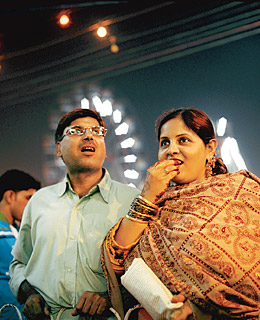
Enjoying the Ride
A couple take in the excitement at a fair in Delhi, October 2006
Political slogans often outpace reality. When Rajiv Gandhi was campaigning in the late 1980s, he liked to say "Mera Bharat Mahan [My India is Great]." A TV advertisement put the phrase to a catchy tune. But few Indians had TVs in those days and while millions appreciated the sentiment, not all believed it.
It makes more sense now. Sixty years after independence, India is beginning to deliver on its promise. Over the past few years the world's biggest and rowdiest democracy has matched its political freedoms with economic ones, unleashing a torrent of growth and wealth creation that is transforming the lives of millions. India's economic clout is beginning to make itself felt on the international stage, as the nation retakes the place it held as a global-trade giant long before colonial powers ever arrived there. That success may yet act as an encouragement to Pakistan and Bangladesh, still struggling to overcome longstanding questions around Islam's role in their societies. Despite its current political turmoil, Pakistan's economy, too, has boomed over the past few years, and Bangladeshis hope that if the current military-backed government can sort out its mess of corruption, the country can soon return to democracy and a re-energized economy.
The challenges facing the subcontinent, of course, are enormous. Indian infants are more likely to be malnourished than African ones, infrastructure is straining to keep up with the economic boom, while corruption, discrimination, religious violence, child labor, bad schools and pollution persist. When the economy tightens or when tensions with Pakistan threaten war, a new slogan appears on India's auto-rickshaws: "Mera Bharat Pareshan [My India is Troubled]."
But none of this means that the country's massive shift is an illusion. Twenty years ago the rest of the world saw India as a pauper. Now it is just as famous for its software engineers, Bollywood movie stars, literary giants and steel magnates. Photographer Prashant Panjiar, who took the photos for the following story on the Malhotra family, has detected a new confidence in the past few years. "A lot of people are still poor but there is a sense of purpose now," he says. "That old Indian fatalism has gone." Indeed, these days a new slogan has appeared on the back of the auto-rickshaws, a simple statement that captures the excitement and promise palpable in many parts of the country. "Mera Bharat Jawan," it reads: "My India is Young."